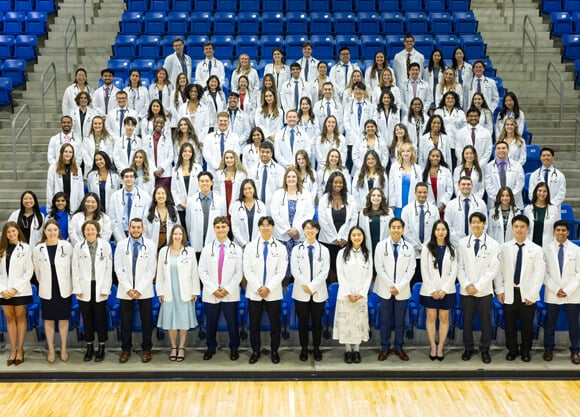
White Coat Ceremony welcomes Frank H. Netter MD School of Medicine Class of 2029
August 11, 2025

August 11, 2025

Selected from a pool of 9,426 applicants, the 95-member Class of 2029 represents 22 states and 59 unique universities. Among them, members speak 18 languages, include 13 students born outside of the United States and represent 19 first-generation college students.
Family and friends attended the celebratory ceremony on August 8 in the M&T Bank Arena on the York Hill Campus, one week after the cohort convened for the first time at the School of Medicine on the North Haven Campus. Associate Dean for Student Affairs and Admissions Steve Paik, MD, EdM, shared impressive statistics defining the Class of 2029.
Paik noted the cohort arrived with a combined 45,972 hours of leadership experience; 78,557 hours of volunteer experience; 135,251 combined research hours; and 307,488 hours of medical and non-medical work experience.
“That’s the starting point of this cohort and the perspectives that you bring from all the different, unique, and diverse experiences that you’ve had,” Paik said. “That being said, we’ve gotten to know you this past week, and you are better in person than anything on paper. We are impressed by your energy, engagement, and positivity, and the way that you have come together as a community and in building community with each other.”
The short white coats bestowed upon the first-year students are worn by those who are newly initiated to the medical profession. School of Medicine Interim Dean Lisa Coplit, MD, said donning the coat represented a transformative moment for the Class of 2029. Coplit is also the senior associate dean for faculty affairs and professor of medical sciences at the School of Medicine.
“In a few minutes, you will slip your arms into a white coat for the first time. That single act is simple, but its meaning is enormous. It signals your entry into a profession dedicated to healing, inquiry and service,” Coplit said. “Your responsibility is to continually seek to be worthy of the trust in the patients for whom you wear it. It comes with a promise of duty and expertise and while you are early in your journey towards that promise, we all know that you have arrived with tremendous capacity for serving, caring and learning – everything you need to become outstanding physicians.”
In her keynote address, Listy Thomas, MD, MBA, FACEP, said the first-year medical students are stepping into medicine at a time of breathtaking change. Thomas chairs Hartford HealthCare’s St. Vincent’s Medical Center Department of Medicine in Bridgeport, Connecticut, and serves the School of Medicine as assistant dean for simulation and a professor of medicine.
“As we approach the age of superintelligence, and the singularity becomes more of a reality with every passing second, we don’t really know what the future of medicine will look like. Agentic AI will revolutionize how we work, how we think, how we teach medicine,” said Thomas.
As a framework to approach their story of becoming physicians in the world of AI, students can adhere to their professional identity by applying some familiar laws of the universe, said Thomas. One is the first law of thermodynamics, which states energy is not created nor destroyed.
“Energy in medicine has an exponentially transformative capacity. Remember that every act of care, every listening ear, every steady hand has a healing energy that moves forward. Compassion, like energy, is never lost, it only changes form,” Thomas said. “AI can suggest a diagnosis, but you will have to give that diagnosis meaning to the person in front of you. Nothing can replace the energy of a beating heart, and only you can look at the eyes of a scared family member and say, ‘I am here with you.’ That’s not information, that’s professional identity.”
Fourth-year medical student Edison Tenecela, MD ’26 addressed the importance of maintaining humanism in medicine as the first-year students work toward becoming independent, practicing physicians.
“Once you wear the white coat, you’ll take it to see standardized patients, go to the clinical wards, and eventually residency and into attending. The coat doesn’t necessarily make you a doctor yet, but it is a symbol that you care, that you listen, and that you’re available for patients in their most vulnerable moment,” Tenecela said. “From the first time that you put on that white coat, until the last day that you lay down your stethoscope, you will be an asset to the community. People will have respect for you and will seek that knowledge that you have.”
Coplit reminded the cohort that in four years, the graduating Class of 2029 will reconvene to be cloaked in long white coats representing the seniority and experience of a physician.
“The next time that we’re all sitting here together, it will be your graduation. And when we get there, you will no longer need your white coat to know you are a physician. It will be a fundamental part of who you are as a human being. And it’s much closer than you think,” Coplit said. “So until then, let the coat remind you daily of the privilege it is to stand at a patient’s bedside, of the communities that you are called to serve, and of the future that you have the power to design. Class of 2029, welcome to the Frank H. Netter MD School of Medicine, welcome to Quinnipiac, welcome to our shared profession; and welcome to the journey of a lifetime. We are honored to walk it with you.”
Quinnipiac Today is your source for what's happening throughout #BobcatNation. Sign up for our weekly email newsletter to be among the first to know about news, events and members of our Bobcat family who are making a positive difference in our world.
Sign Up Now